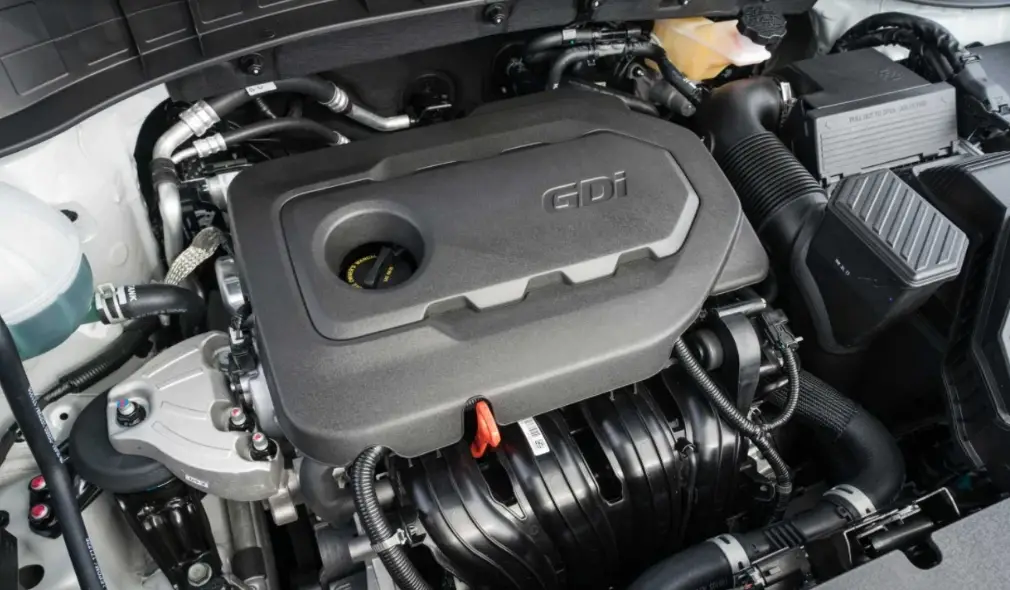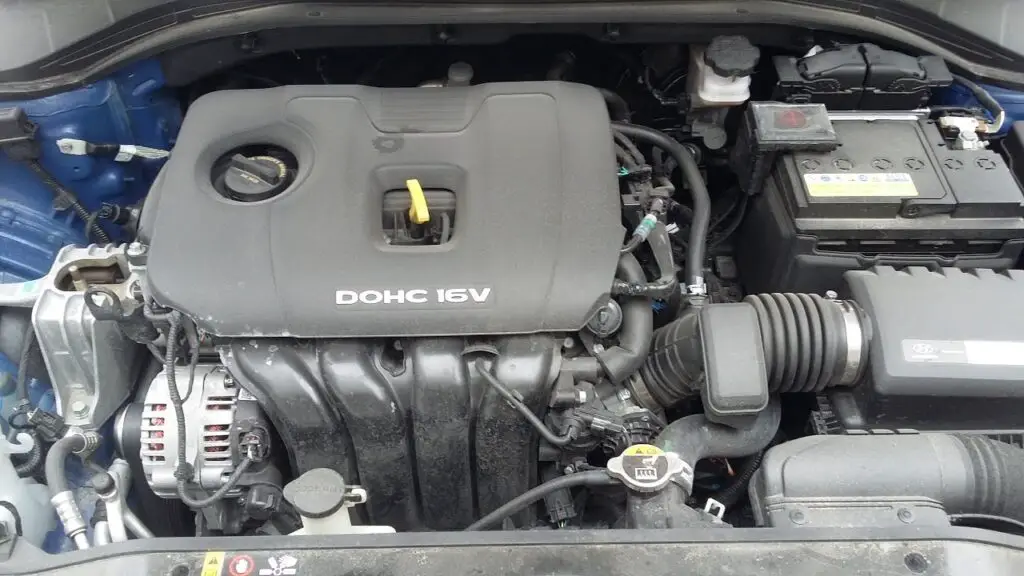Hyundai 4-cylinder engine problems commonly include oil consumption, engine knocking, and timing chain failures. These issues can affect performance, but regular maintenance can help prevent them.
Hyundai’s 4-cylinder engines, which power a range of models including the Hyundai Elantra, Sonata, Tucson, and others, are well-regarded for their efficiency and performance. However, like any engine, Hyundai’s 4-cylinder engines are not without their potential issues. Over the years, some common problems have surfaced, leading to concerns among owners about reliability and long-term durability. If you own a Hyundai vehicle with a 4-cylinder engine, knowledge about these problems and knowing how to address them can help you extend the lifespan of your vehicle and avoid costly repairs.
In this blog post, we will explore the most common issues reported in Hyundai’s 4-cylinder engines, how they affect performance, and what steps you can take to prevent or resolve these problems.

Contents
Common Hyundai 4 Cylinder Engine Problems
Hyundai’s 4-cylinder engines, particularly the Theta II and Gamma engines, have garnered attention for specific recurring issues. These engines are used in popular models such as the Hyundai Elantra, Sonata, Tucson, and Veloster. Let’s dive deeper into the major problems that these engines have faced.
1. Excessive Oil Consumption
Excessive oil consumption is one of the most common issues reported by Hyundai owners, particularly those with 2.0L Theta II engines. Drivers have noticed that their vehicles burn through oil much faster than expected, leading to the need for frequent oil top-ups between oil changes. This issue is especially problematic for those who fail to monitor their oil levels regularly, as it can result in engine damage or even total engine failure if the oil level gets too low.
This issue typically arises from the piston rings not creating a proper seal, causing oil to seep into the combustion chamber. This leads to increased oil consumption and can cause the engine to burn oil more quickly. The problem has been observed in various Hyundai models, including the Elantra and Sonata, manufactured between 2011 and 2019.
What can you do about it?
If you suspect that your Hyundai 4-cylinder engine is consuming excessive oil, it’s crucial to keep an eye on your oil levels and monitor them regularly. If the oil consumption is excessive (more than a quart per 1,000 miles), it may be a good idea to take your car to a Hyundai dealership to check if the vehicle is eligible for a recall. Hyundai has issued a recall for some models to address this issue, including replacing faulty piston rings.
2. Engine Knocking and Stalling
Hyundai 4-cylinder engines, especially the 2.0L Theta II engine, have been known to experience engine knocking or stalling, particularly under heavy acceleration. Knocking sounds are caused by the combustion process not occurring in a uniform manner, with some of the air-fuel mixture igniting before it should. This premature combustion causes a “knocking” noise.
The stalling issue is often related to timing chain problems or rod bearing failures. A faulty timing chain can lead to incorrect valve timing, which could cause the engine to stall, lose power, or even damage internal components.
What causes this?
These issues are often caused by timing chain tensioner failures, worn-out rod bearings, or issues with the valve timing. In certain models, the timing chain can become loose, resulting in improper synchronization between the crankshaft and the camshaft. As a result, the engine experiences misfires, knocking, and stalling. It’s also worth noting that some Hyundai 4-cylinder engines suffer from rod bearing failures, which can cause engine knocking and complete engine failure if not addressed promptly.
What can you do about it?
If your Hyundai 4-cylinder engine is experiencing knocking or stalling, it’s vital to address the issue quickly. Visit a qualified mechanic or your Hyundai dealership to inspect the timing chain, rod bearings, and other internal engine components. Hyundai has been known to cover certain repairs related to these issues under warranty, so make sure to check if your vehicle is still eligible.
3. Carbon Buildup in Direct Injection Engines
Hyundai’s Gasoline Direct Injection (GDI) engines, like the 1.6L Gamma engine, have a known issue with carbon buildup. GDI engines use high-pressure fuel injectors that spray fuel directly into the combustion chamber, bypassing the intake valves. While this improves fuel efficiency, it also means that the intake valves don’t get cleaned by fuel as they would in traditional port injection engines.
Over time, carbon deposits build up on the intake valves, causing reduced engine efficiency, rough idle, and loss of power. This issue can be exacerbated if regular cleaning is not performed, leading to significant engine performance issues.
What causes this?
The carbon buildup is caused by the nature of GDI systems, which inject fuel directly into the combustion chamber, missing the intake valves. Without fuel washing over the valves, carbon deposits accumulate, which restricts airflow and reduces engine performance. This is particularly problematic in the 1.6L and 2.0L GDI engines used in models like the Elantra, Sonata, and Tucson.
What can you do about it?
Routine maintenance and cleaning of the intake valves are crucial for owners of GDI-equipped Hyundai vehicles. Hyundai recommends using a fuel system cleaner or having the intake valves cleaned professionally every 60,000 to 100,000 miles to keep carbon buildup under control. If the buildup is severe, the intake valves may need to be physically cleaned using specialized equipment, which can be done at a dealership or a qualified mechanic’s shop.
4. Timing Chain Failures
Timing chain failures are a known issue with certain Hyundai 4-cylinder engines, particularly the 2.0L Theta II engine. Timing chains are responsible for synchronizing the crankshaft and camshaft, ensuring that the engine’s intake and exhaust valves open and close at the correct times. If the timing chain is faulty or breaks, it can cause severe engine damage.
The most common symptoms of timing chain failure are engine misfires, loss of power, and the engine warning light illuminating. If not repaired, a broken timing chain can lead to engine failure.
What causes this?
Timing chain failures are often caused by worn-out tensioners, damaged sprockets, or improper oil lubrication. The Theta II engine, which powers various Hyundai models like the Sonata and Elantra, has been particularly prone to this issue. Poor lubrication due to dirty or low engine oil can lead to premature wear of the timing chain components, causing failure.
What can you do about it?
If you experience symptoms of timing chain failure, it’s important to have the engine inspected immediately. Ignoring this issue can lead to costly repairs or even a total engine replacement. If your vehicle is still under warranty, Hyundai may cover the repair cost. Regular oil changes using the recommended oil grade can help prevent this issue from occurring.
5. Overheating and Oil Sludge
Overheating and oil sludge buildup are problems that have been reported in Hyundai’s 4-cylinder engines, particularly in models that use the 2.0L Theta II engine. If the engine runs too hot or if the oil is not changed regularly, it can lead to oil sludge – a thick, tar-like substance that can clog the oil passages in the engine, reducing lubrication and leading to serious engine damage.
What causes this?
Oil sludge is often caused by poor oil quality, irregular oil changes, or overheating. If the engine oil is not changed regularly, contaminants build up and form sludge, which can clog the oil filter and reduce the oil flow to vital engine components. In some cases, faulty oil coolers or radiator problems may also contribute to engine overheating.
What can you do about it?
To prevent overheating and oil sludge buildup, make sure to change your engine oil regularly, using the manufacturer-recommended oil and filter. Additionally, check the coolant levels and monitor the engine’s temperature gauge to prevent overheating. If you suspect oil sludge buildup, a mechanic may need to clean the engine using special cleaning agents to remove the sludge.

Frequently Asked Questions
Here are some FAQs about Hyundai 4 Cylinder Engine Problems –
1. Are all Hyundai 4-cylinder engines affected by these issues?
Not all Hyundai 4-cylinder engines experience these problems. The 2.0L Theta II engine and 1.6L Gamma GDI engine are particularly prone to issues like excessive oil consumption, carbon buildup, and timing chain failures. However, other engines, such as the 2.4L and newer 1.6L versions, have shown improved reliability.
2. How can I prevent excessive oil consumption in my Hyundai 4-cylinder engine?
To prevent excessive oil consumption, ensure regular oil changes using the recommended oil grade, and monitor oil levels closely. If your vehicle is consuming excessive oil, it may be eligible for repairs or recall under Hyundai’s warranty.
3. Is it safe to drive a Hyundai with engine knocking or stalling?
No, it is not safe to drive a Hyundai with engine knocking or stalling. These issues can lead to more severe engine damage if not addressed. If you notice these symptoms, it is best to have your vehicle inspected immediately.
4. How often should I clean the intake valves on my GDI engine?
For GDI engines, it is recommended to clean the intake valves every 60,000 to 100,000 miles. However, if you experience rough idling or loss of power, you may need to clean them sooner.
5. What should I do if my Hyundai engine overheats?
If your engine overheats, stop driving immediately and allow the engine to cool down. Check the coolant levels and inspect for leaks. If overheating persists, have your vehicle inspected by a mechanic to prevent further engine damage.
Conclusion
While Hyundai’s 4-cylinder engines are generally reliable, they are not without their share of issues. Problems like excessive oil consumption, engine knocking, carbon buildup in GDI engines, timing chain failures, and oil sludge can all affect performance and longevity. Regular maintenance, early detection of issues, and following Hyundai’s service recommendations can help you prevent many of these problems and keep your vehicle running smoothly for years to come.
If you experience any of the symptoms mentioned above, it is essential to address the issue promptly by consulting with a qualified mechanic. With proper care, Hyundai’s 4-cylinder engines can continue to deliver excellent performance and reliability for many years.